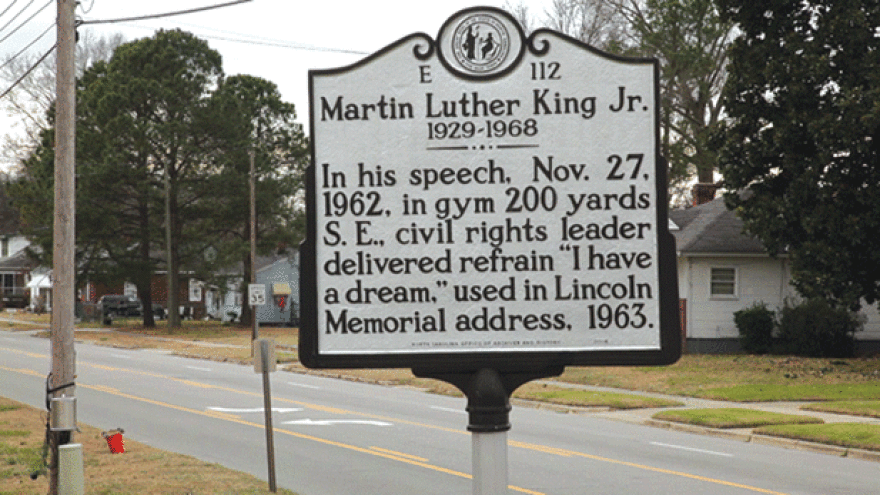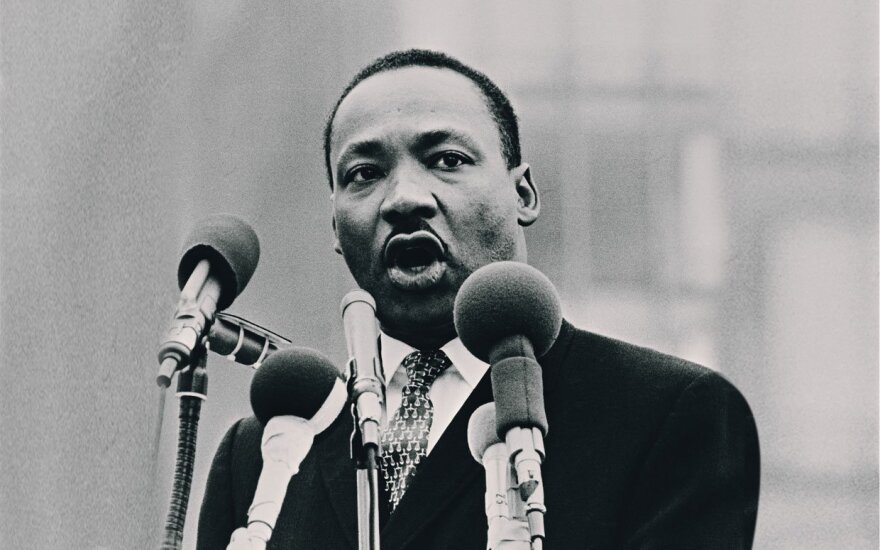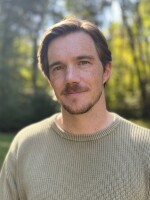“I have a dream tonight. It is a dream rooted deeply in the American dream.”
Eight months before Dr. Martin Luther King Jr. delivered his iconic “I Have a Dream” speech in Washington D.C., he spoke these words to a crowd of 1,800 people in a Rocky Mount gymnasium on November 27, 1962.
It was a key moment in the course of King’s leadership against segregation and racial discrimination in the South, but one that has largely been forgotten. An old reel-to-reel recording of the speech has endured in the Rocky Mount public library, known to the town’s residents but hidden from the rest of the world.
Listen to a clip of that speech below:
W. Jason Miller, Professor of English at North Carolina State University, found the recording, restored it and has now released it in a digital form. Miller said it is the first documented moment King speaks the refrain from his “I Have a Dream” speech.
“I couldn’t believe Rocky Mount played this critical moment in this speech's history, a speech that is the most recognizable speech in American history,” Miller said. “I was stunned after all the archives, letters and papers I’d gone through that this had happened.”
For seven years, Miller has been researching how King used the poetry of Langston Hughes in King’s speeches and sermons for his book, “Origins of the Dream: Hughes's Poetry and King's Rhetoric.” Miller said King was inspired by Hughes’s “I Dream a World” and “A Dream Deferred,” using ideas of integration and transformation in his speeches.

“This is the key evidence documenting Dr. King used Langston Hughes's poems. Hearing Dr. King say these words, it was literally the kind of thing we talk about with hair standing up on your arms and chills going down your spine,” he said. “You’re back in that moment in time, a moment that is historical, poetic, transformative and critical to our nation’s history.”
Miller took the original audiotape recording of King’s speech at Rocky Mount’s old Booker T. Washington High School to audio archivist George Blood in Philadelphia. Miller said Blood “wrote the book” for the Library of Congress on how to digitize old materials. Throughout his research, Miller said he has listened to about 120 of King’s speeches, but this one stands out from the rest.
“I’ve never heard King combine a public address with the energy of a mass meeting and the force of a civil rights speech,” he said. “It has Dr. King’s most famous refrains all together for the only time I know of. He begins the speech with the famous ‘How Long, Not Long,’ which he makes at the end of the Selma march, then he goes into ‘I Have a Dream,’ and then goes into ‘Let Freedom Ring.’
The speech in Rocky Mount is the first recorded evidence of King's "I Have a Dream." However, John Llewellyn, communications professor at Wake Forest University, and William Murphy, a recent WFU graduate, have identified strong parallels between King's famous speech and another he gave as a 15-year-old high school student.
Murhpy said he was researching for Llewellyn's first-year seminar when he found similar themes and imagery between "I Have a Dream" and a speech King gave in Dublin, Georgia in 1944 at a Georgia Black Elks speech contest. Llewellyn said he was surprised other scholars had missed the similarities.
"Brotherly love, nonviolence and freedom from racial hatred are all contained in his 1944 speech," Llewellyn said. "He even described scenes of black and white children playing together in harmony - famously echoed in the 'Dream' speech."
The text to the 1944 speech can be found here. Miller said the full audio of the speech in Rocky Mount will be available through a website being developed called kingsfirstdream.com. The speech will be a part of a documentary on King's and Hughes's relationship called "Origins of the Dream" by Miller and documentary filmmaker Rebecca Cerese.
Below is a transcript of the speech's clip:
And so my friends of Rocky Mount, I have a dream tonight.
It is a dream rooted deeply in the American dream.
I have a dream that one day down in Sasser County, Georgia, where they burned two churches down a few days ago because Negroes wanted to register and vote, one day right down there little black boys and little black girls will be able to join hands with little white boys and little white girls and walk the streets as brothers and sisters.
I have a dream that one day right here in Rocky Mountain, North Carolina, the sons of former slaves and the sons of former slave-owners will meet at the table of brotherhood, knowing that out of one blood God made all men to dwell upon the face of the earth.
I have a dream that one day men all over this nation will recognize that all men were created equal and endowed by their creator with certain unalienable rights.
I have a dream tonight. One day the words of Amos will become real: “Let justice roll down like waters and righteousness like a mighty stream.”
I have a dream tonight. One day every valley shall be exalted and every mountain and hill shall be made low. Crooked places will be made straight, and the rough places will be made strange, the glory of the Lord will be revealed and all flesh shall see it together.
I have a dream tonight. One day men will do unto others as they would have others to do unto them.
I have a dream tonight. One day my little daughter and my two sons will grow up in a world not conscious of the color of their skin but only conscious of the fact that they are members of the human race.
I have a dream tonight that someday we will be free. We will be free.








